Dan Harmon’s Community is a revel of nerdom. It began as a sitcom about six classmates in a community college Spanish class, and it became so much more.
Over six seasons viewers were gifted with a stream of gloriously indulgent pop culture homages, quilted together into what might be described as a genre-of-the-week format. The show blended sitcom with western, mafia, murder mystery, dystopia, road trip, animation, documentary, and more. More than just giving a coy glance over them, the show understood why viewers love genre fiction—genres provide us with a playground, and that’s exactly how the episodes treat them. You want slow-mo walking shots and Mexican standoffs? You got ‘em. Think a Synthetic Plague won’t work in a sitcom about college students? Think again. As much as it is about friendship, coming of age, and (excuse me) community, Community is largely a story about stories, and why we love to tell them.
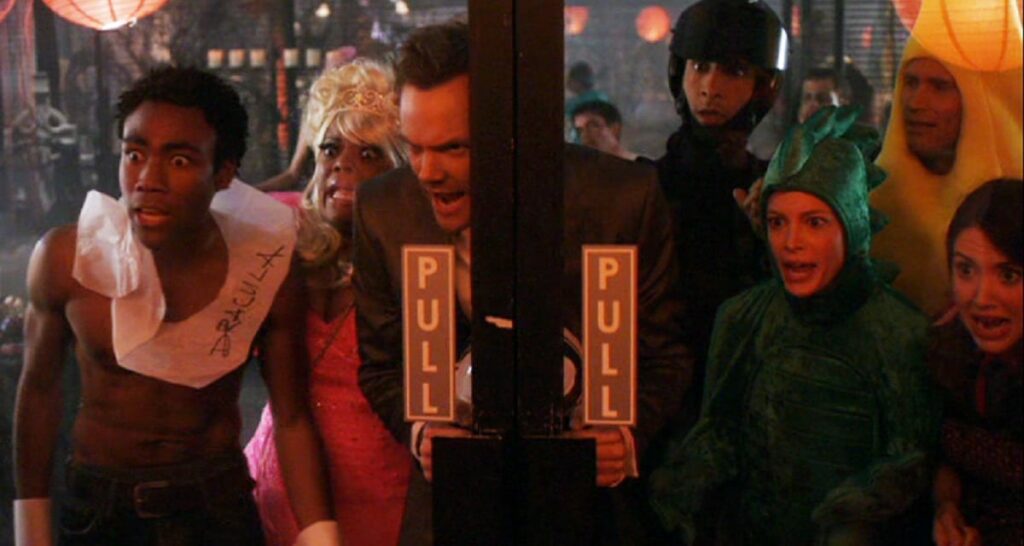
“If I wanted to learn something, I wouldn’t have come to community college”
– Jeff Winger, ‘Pilot’
In recent times the phrase ‘main character syndrome’ has become something of a buzzword on social media. Possibly no main character has a worse case of main character syndrome than Jeffrey Winger—Mr “This has been about me the whole time” himself (‘Contemporary American Poultry’)—and not in an endearing meta-fictional way. It’s ironic that he believes himself to be the hero, but doesn’t act like one; instead he is rude and selfish, and not the kind of protagonist a viewer would aspire to be. Community does not allow for idolatry, since core members of the study group will become villains for standalone episodes (such as Shirley in ‘App Development and Condiments’). Perhaps sentimentality wasn’t on the writers’ minds, and yet the joy of the story is we are reeled into these characters’ hearts anyway.
In the series finale (the aptly named ‘Emotional Consequences of Broadcast Television’) Jeff imagines a future in which he and Annie have settled down together—make-believe Annie turns to him and asks: “is this really what you want?” This is significant, since one season earlier (in ‘Basic Story’) Jeff had said to the real Annie: “I’m not dreaming about settling down”. The skeleton of any character arc is the tension between what a character wants and what a character needs. We love storytelling because the this dichotomy promises that in the end we will get what we really need. But Jeff’s story is left unusually open; his ‘want’ is deliberately ambiguous, and his ‘need’ is to be okay with this.
“I’m a storyteller not a preacher”
– Abed Nadir, ‘Messianic Myths and Ancient Peoples’
One of the demands of the comedy genre is a happy ending for the heroes, and suitably jocular punishment for the villains. Ken Jeong’s character, Ben Chang (otherwise known as ‘Kevin’ or ‘El Tigre’) has several villainous incarnations over the course of the show, however he is last seen happily toasting to the future with the remaining core cast… perhaps only free to betray the group another day. In the fate of its major antagonist, the show abandons didacticism for a ‘the friends we made along the way’ type resolution. In fairness, to see Chang locked away in jail would probably have put a dampener on the overall tone, and the creator’s desire to continue milking Jeong’s comedic ability no doubt contributed to the narrative flexibility of the character. If this was real life, there would be rules to follow; if this was even a different genre, or a less creative show, there would have been rules there too. What good would storytelling be, if it had to abide by the rules?
“Everything’s a story, Jeff. Getting out of bed is a story. Certainly this is a story. […] You’re literally dragging me across a threshold demanding there be no story, which puts me into a whole new world that I’m gonna have to adapt to”
– Abed Nadir, ‘Basic Story’
Season 5 brought us the episode where the story is “there is no story”: ‘Basic Story’. Jeff makes the self-aware comment that Greendale “is addicted to crisis” as Abed struggles against his storytelling instincts, making several references to the Hero’s Journey (“call to adventure!”). After Jeff chastises Abed for trying to find a story where there is none, the lingering shot on a random student drinking soup emphasises the complete lack of relevant plot information in this non-plot. Abed will go on to fabricate dramatic beats, complete with jump-cuts, swelling music, and exaggerated sighs. In defence of television, sometimes things have to be contrived, or else there wouldn’t be a show.
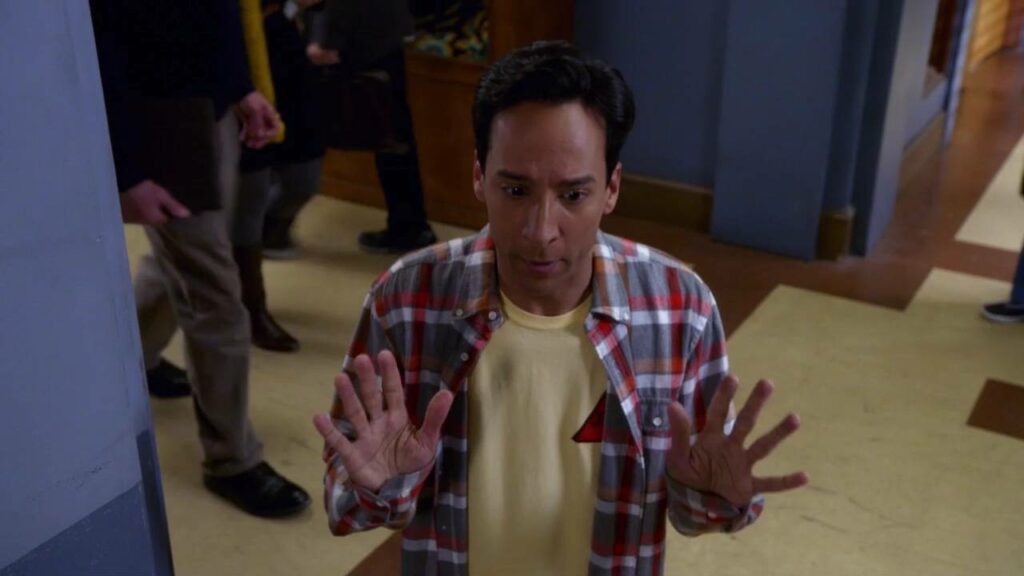
Though he wouldn’t put it in so many words, Jeff is as desperate for a story as Abed is. At the prospect of having to leave Greendale (how many times is that now?) he is plunged into anxiety. “This is what matters, isn’t it?”—he asks Britta—“this is what keeps this all from being pointless”. He’s referring of course to his Season 1 objective: to sleep with Britta. And since he achieved that by the 23rd episode, his story, in theory, should have been complete long ago, and now he is at a loose end. So Jeff and Britta tell themselves a new story: that they were meant to be together all along, so that they can round off their joint arc and say ‘mission accomplished’. The desire for closure is relatable, but it’s also a lie. As Annie will go on to point out, storytelling can be self-destructive.
The episode ‘Intermediate Documentary Filmmaking’ exemplifies Harmon’s ability to play with form. The plot of the episode is fairly simple, consisting mostly of conversations between two characters in Pierce’s hospital room. But the writers have taken advantage of the format. It works well for a story concept such as this, which runs on promises, lies, and manipulation, as the documentary format allows us to take an overhead view at the information that the characters will withhold from each other but not the camera. It even goes so far as to have Shirley orchestrate her own talking-head, the act of which is crucially symbolic to her particular arc in this episode. Thus it becomes more about the way that the story is told than the story itself.
A crucial function of storytelling is to provide escapism. The Pilot opens with the legend “Greendale Community College, three blocks from your home”, boasting a mundane familiarity that suggests it wants to be a ‘this could be you and your classmates’ kind of story. Indeed, the concept for the Pilot was inspired by creator Dan Harmon’s profound experience getting to know a group of strangers in the study room of his own community college. In an interview for The Independent, Harmon said: “the two thoughts I had were: I’ve been really distorted in my view of the universe and this is the kind of pilot networks are always wishing I would write.”
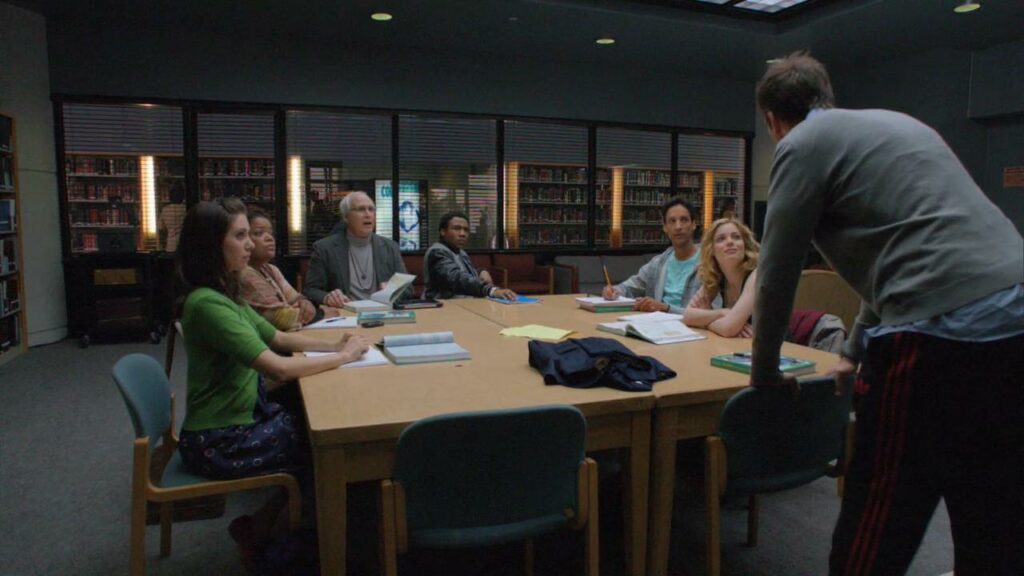
But as much as it is about bringing together ‘real’ and flawed characters, the world of Community is much better than reality. It has to be, or there would be no story. There certainly wouldn’t be spontaneous detours into stop-motion animation. The episode in question (‘Abed’s Uncontrollable Christmas’) represents escapism for Abed in the same way that the show represents escapism for the audience. This is again how the show manages to exploit the best facets of genre and storytelling.
“If we were going to fabricate a delusion, why would we fabricate a community college?”
“Ah yes, this fantastical community college, where everything that happens is unbelievably ridiculous, and it all revolves around you as a group”
– Jeff Winger & Dr. Heidi, ‘Curriculum Unavailable’
Community is a show with alternate selves. Where a sci-fi or drama series might use fiction’s paradoxical relationship with truth for existential ends, Community finds yet more opportunity to play. A clear example would be the multiple timelines in ‘Remedial Chaos Theory’, which spawns the Evil Doppelgangers, who return to meddle with reality in ‘Advanced Introduction to Finality’. The montages in ‘Paradigms of Human Memory’ give glimpses of speeches that we never heard Jeff make, and those in ‘Curriculum Unavailable’ include shots of a black-and-white ’20s gangster paintball episode that never happened. The latter episode also includes multiple ‘Greendale doesn’t exist, oh wait it does’ fake-outs, including a posited “shared psychosis”. Garett as a doctor in the asylum sequence acts rather like a show writer, commenting “I want to see what happens if we confiscate one of their pens” (a reference to ‘Cooperative Calligraphy’). Other alternate realities include that Greendale is purgatory, shows within shows (‘History 101’) and the uncanny fictional night school (‘Conspiracy Theories and Interior Design’). In yet another schism of reality, in ‘Mixology Certification’ the same bar has two names—L Street and The Red Door—and two personalities, representing respectively to Jeff and Britta the bar that they want it to be. Alternate timelines present the ability to explore and play without doing any damage—this says as much what watching TV is as writing it.
“Either I’m God, or truth is relative”
– Jeff Winger, ‘Pilot’
‘Conspiracy Theories and Interior Design’ delights in peeling the onion on fake realities—as much as it skewers conspiracies, it is also amusingly meta about the nature of truth in the show as a whole. What is objectivity if not a collection of subjectivity? Returning to ‘Abed’s Uncontrollable Christmas’—here Abed’s subjective experience is of a claymation world. Is it real? Doesn’t matter, it’s all fiction anyway.
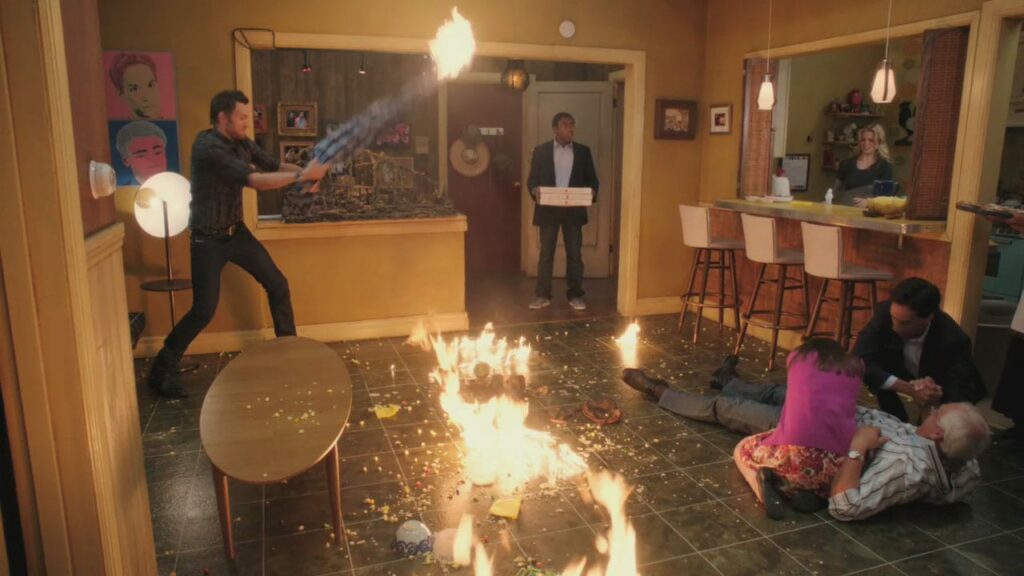
Through the character of Abed, meta-storytelling is opened up. In true postmodern style, the show likes to remind us frequently that the characters are characters. In ‘Contemporary American Poultry’, on Abed’s whiteboard, the other characters are reduced to lists of ‘likes’ and ‘dislikes’—much as they might be in the primitive stages of writing (or maybe building a D&D campaign). One can both celebrate and lament the simplicity of storytelling in this sense, because it is both useful and sad to admit that the characters aren’t real people.
“Things have a certain structure to them, you know? If we stray from it we’re weird, if we stick to it, we’re boring”
– Abed Nadir, ‘Emotional Consequences of Broadcast Television’
In the show’s finale we are shown glimpses of alternate futures as the characters each ‘pitch’ their own Season 7. That is perhaps the gift of an ending, that we never find out which, if any, are close to coming true, because there is always a conflict between what the audience wants, what can be justified by the writers, and what will be commissioned by the studio. The hardest lesson that TV teaches us is that sometimes people are only in our lives for a season. Justin Roiland’s cameo character in ‘Emotional Consequences of Broadcast Television’, Ice Cube Head, has the perfect finale superpower—one zap to the chest with cool blue light and the characters’ problems are solved. But that’s not the point of a finale. The point of an ending is not necessarily to provide all the answers—Community gives us no ‘ten years reunion’ epilogue, no guarantee that the study group remains friends. What we are given instead is enough to hope for our own personal Season 7.
The melancholy tone of the finale begs the question—why do we want so much for them to have a happy ending? And at what point over the last six years did this happen? Is it a crime to treat characters like real people? That’s the danger of television—it always manages to trick us into thinking we have made friends, and there are always emotional consequences when it ends.
In the finale Abed gives a monologue spelling out why he (and we) love TV. “It has to be joyful, effortless, fun”. Check, check, and check. Community exists to be playful and make people laugh, and partly to exorcise a need to be childish. Good sitcoms can get the self-contained 20 minute story down to an art form, and the art is the courage to go “crazy-town banana pants” (‘Curriculum Unavailable’).
“TV defeats its own purpose when it’s […] being proud or ashamed of itself for existing”—this is reassuring for a fan of TV to hear. Abed’s love of fiction propels him to be a hero on several occasions (such as sacrificing himself to the zombies so that Troy can get away in ‘Epidemiology’). We all probably wish we could be more like Abed.
“It’s TV; it’s comfort. It’s a friend you’ve known so well, and for so long you just let it be with you”. There is comfort in TV. We can re-watch it in a way that we wish we could rewind our lives. And maybe we wish we had the ability to “spin-off into something safer” (‘Basic Sandwich’).
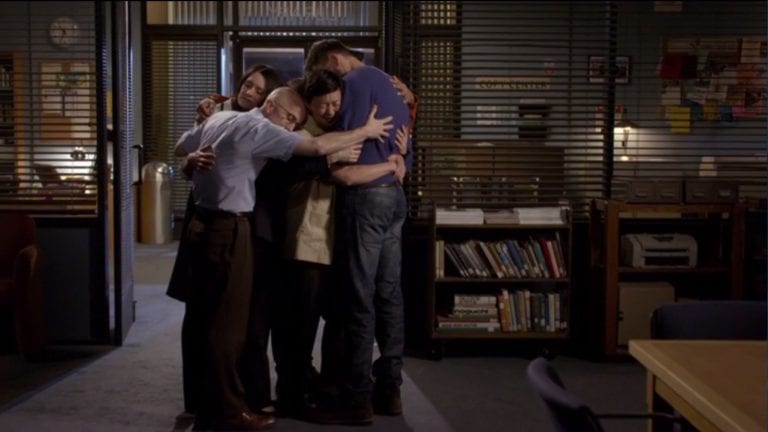
Finally, if there’s one thing to take away from the show it’s that the right way to wrap anything up is with a heartfelt and self-congratulatory monologue…
“People can connect with anything. We can sympathise with a pencil, we can forgive a shark”
– Jeff Winger, ‘Pilot’
You don’t need to study anthropology to know that storytelling is in our nature. We as human beings have been compelled to tell stories since we first developed language. Why do we love storytelling? Jeff Winger spins a good yarn, because—in the least charitable interpretation—he likes to be able to control people with his words. He used to make a living doing it as a lawyer. Jeff needs to control the “machine” (‘Contemporary American Poultry’) i.e. the narrative. But he repeatedly uses this power for good (though arguably it is never unselfish), bringing the group together just in time to save the day. For Pierce Hawthorne, storytelling is important, because in a story he is the hero. He craves an underdog story. It’s ironic that his major conflict (that with his deceased father) has to be enacted in a video game, a secondary fictional plane (‘Digital Estate Planning’). For Troy Barnes, stories allow him to shake off his ‘cool’ persona and indulge his imagination; he also uses storytelling to exercise his compassion for Abed. For Abed Nadir, story means order, structure, and the ultimate comfort; in many ways he is the voice of the viewer. Annie Edison loves storytelling because she too wants to be the hero, but because she is young and hasn’t decided what she wants to do with her life, stories allow her to be all kinds of people.
“I pretended to be a different person […] I did it because I’m not sure who I am”
– Annie Edison, ‘Mixology Certification’
Television makes us believe that life can be weekly pockets of adventure. Each story represents one cycle or another of humanity. The hero faces a challenge, the hero makes a mistake, the hero seeks guidance, the hero learns. And at the end, the hero moves on. Greendale may be a fantastical place, not quite something that you’d really find “three blocks from your home”, but it is significant that the Dreamatorium is powered by nothing more than cardboard tubes and duct tape. There is magic amongst the mundane. Magic is other people.

